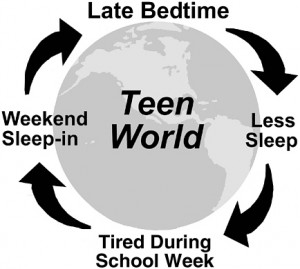 Many parents wrestle with helping their teenagers get enough sleep, especially when high school classes start before dawn. Battling early school start times and teens’ changing body clocks, which pressure them to fall asleep later, can be overwhelming for parents.
Many parents wrestle with helping their teenagers get enough sleep, especially when high school classes start before dawn. Battling early school start times and teens’ changing body clocks, which pressure them to fall asleep later, can be overwhelming for parents.
Few teens want parents setting their bedtimes. Most of the adolescents resisted their parent’s requests to stop texting or Web-surfing late at night. And don’t fall for the myth that teens can make up lost sleep on weekends; sleeping until noon on Saturdays only lets their sleep clock drift later, making it even harder to wake up on Monday.
Here are some tips for improving their sleep schedule:
1. Educating teens on how sleep loss damages health, energy and appearance can encourage them to set their own limits.
- Research links sleep deprivation to an increased likelihood of weight gain, sadness, depression, poor grades , inability to focus on tasks , andreduced ability to interpret such important social cues as other people’s facial expressions of anger or happiness.
2. Gradually re-align their own sleep cycles by moving bedtimes earlier by about 15 minutes at a time
3. Adjusting teens’ morning and evening exposure to light can help.
- Increasing exposure to morning light, especially sunshine, may increase daytime alertness and make falling asleep easier.
4. Cutting off late-night internet access is another technique, assuming your teen isn’t tech-savvy enough to circumvent your efforts.
- Parents can simply install a simple electronic timer on their wireless router, closing off the Web at 11:15 p.m. Parental-control software or changing the settings on your router can accomplish the same thing.
5. Encouraging exercise can have a major impact.
- Teens who played football three times a week slept far better than peers who didn’t.
http://blogs.wsj.com/juggle/2012/10/17/tips-for-improving-your-teens-sleep-schedule/
